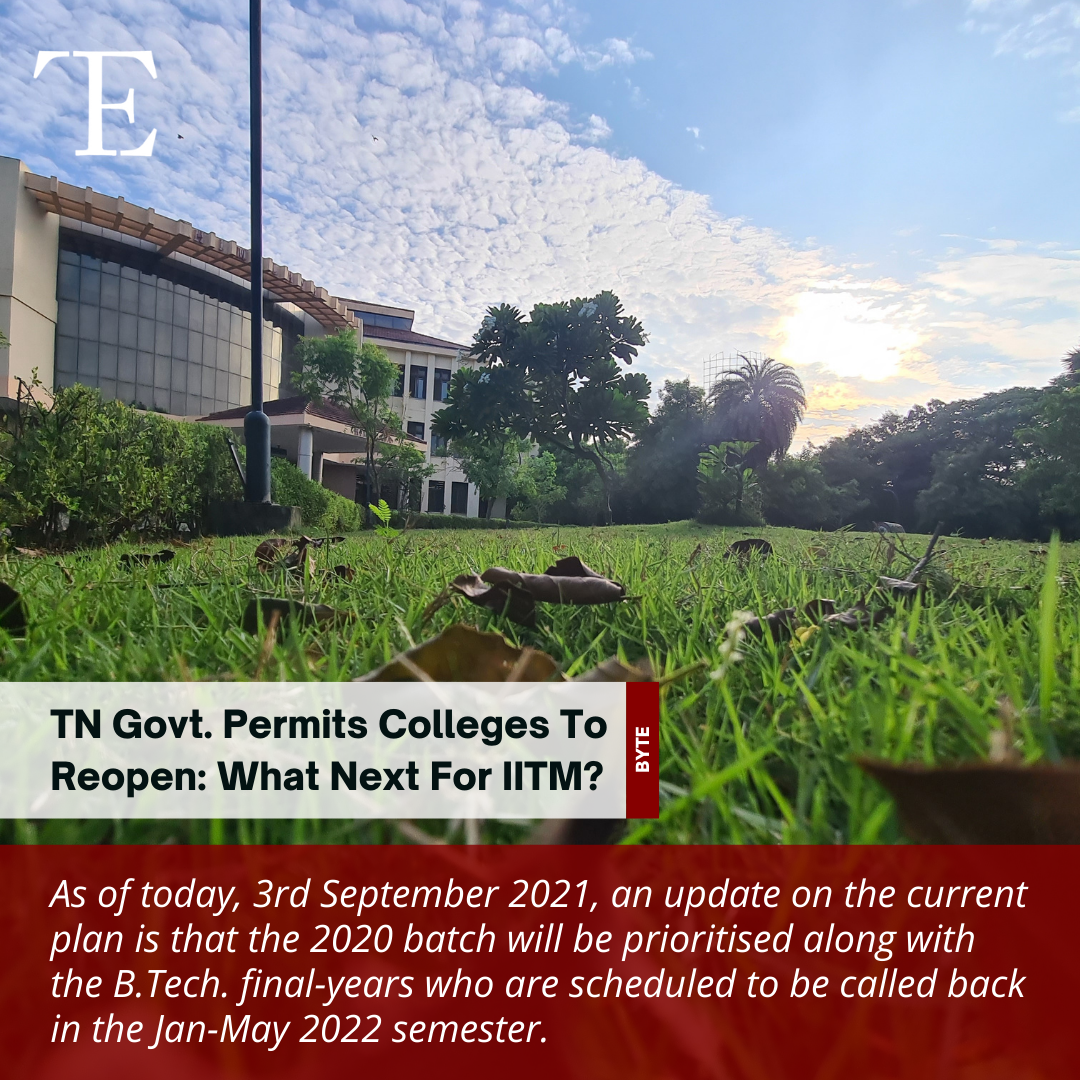Malcolm Forbes once said, “Food may be essential as fuel for the body. But good food is fuel for the soul”. And what every educational campus ought to have without fail is the ability to provide good and healthy culinary options to all who are a part of it, while ensuring uncompromised quality. As the country’s premier institute, IIT Madras has always been able to boast about the diversity of food available on campus, especially in the sheer number of eateries excluding the common mess facilities. However, in a dramatic turn of events in the wake of the pandemic, much of the culinary diversity has gone downhill. With the closure of many popular options such as Stud Dosa, Zaitoon, Krishnas and Ramu’s, the student community has had to manage with just three options for main course food. With the full-fledged opening of insti, the campus was flooded with more students, especially freshies and sophomores, who were bent on exploring everything that the campus had to offer.
Food, a common need, was among the top of the list of things that demanded multifariousness. As a detour from the regular mess food, people are constantly on the lookout for newer and better options. And this “quest” is what brings most to Anjappar, which is deemed an inferior replacement to Zaitoon by senior batches. Most students have a not-so-bad opinion about the dining options on campus, but that’s about it. While the alums and final years were eloquent on the variety and quality of the food available on campus in the pre-pandemic situation, they also expressed a dearth of quality dining options post-pandemic. One of the emails on the following issue mentions that “Anjappar on its best day has not been able to deliver as much as Zaitoon on its worst”. As one of the few on-campus eateries providing main course food, the restaurant is never void of customers. The further narrowing down of choices by the pandemic just made more students flock to Anjappar, especially on account of the reasonable prices and the variety that the menu manifested. However, things started getting problematic as severe mishaps concerning food quality, general hygiene, and staff behaviour were brought to light by students from various years and departments. The issue became increasingly familiar to the entire student community as a long mail thread emerged in the smail inbox in less than a week. Complaints of a highly serious nature were lodged against Anjappar and its management. The allegations against the restaurant were sharp. While the claims made by some of the mails were indeed unbelievable, many carried photographic evidence to back them up. However, there seems to be more to this issue than meets the eye.
The first few emails were regarding the stale food served for lunch on a particular day and the alleged presence of rotten meat mixed in with fresh meat. One of the complaints detailed, “We were served old and rotten chicken, which was prepared extra salty, and this felt like an attempt to cover up for the insipid taste”. Soon, new problems were added, such as the lack of cleanliness in the cutlery provided and hostility on the part of the staff. Going further, students began adding that they had been getting stale food for over a month on a regular basis but provided no clarification regarding why they had not reported it earlier.
An alarming number of emails also cited instances of food poisoning and other health problems among the students after dining at Anjappar on select days.
One of the mails read, “After eating grilled chicken from Anjappar, I became seriously ill twice and needed to rush to the Institute Hospital.” Students also questioned the use of the name “Annam Enterprises” in the billing process when the tender had been provided to the enterprise name “M/s Anjappar Chettinad Restaurant”. As a reply to this, a recent email from the CMGFS Chairman read, “We also discussed with them about the Annam Enterprises vs. Anjappar names. They have asked for 15 days to initiate action in this direction. We are following up with them.”
The declining availability of options has made people more dependent on Swiggy and Zomato. Many complained that they were forced to spend heavily on these services just because of a dearth of outlets providing tasty and hygienic food on campus. There are many statements in the email thread that testify to this:
“The increasing number of students regularly ordering food on Zomato and Swiggy inside campus is not because they are millennials but simply because the food inside is difficult to digest.”
“We are currently being forced to order from Zaitoon and Swiggy just because of the lack of eateries.”
“Walking near the main gate during the evening I observed that approximately 2 out of every 3 motorcycles entering the campus is of a food delivery person. This in turn has also increased the traffic and careless driving on the campus. Students are spending a huge amount of money (other than the mess bill) to survive on this campus.”
About 20 odd emails highlighting various issues at Anjappar were received on the very first day and the CMGFS team had promised to look into the issue with the sobriety the situation demanded. A rejoinder email from the CMGFS on the same day read, “The frequency of inspections for the facility in discussion, has been increased lately and we have looked into all the complaints shared to us via the existing feedback mechanisms, in addition to the individual complaints/ concerns shared privately to individual team members, and have taken the necessary actions firmly. This included multiple warnings and repeated penalties.”
Some mails cite that the closure of eateries has resulted in reduced competition for Anjappar. One of the mails read, “Our institute desperately needs more places to eat. Having more eateries will not allow Anjappar to operate like a monopoly and pay no heed to students’ concerns.” Another similar email read, “The whole system of access to food in IIT Madras needs to be relooked. More eateries at various locations on campus should be started to ensure competition among the players. Students should not keep cycling for 1-2 km to have a cup of tea or a quick snack. This breaks the continuity while studying and is a waste of time. More outlets will ensure both competition as well as easy access.”
When asked about the extreme delay in preparing and serving food, the Anjappar management replied that it was due to the high number of customers coming in.
The CMGFS states that they have taken steps to seriously address and probe the issues raised by the students. In the case of Anjappar, they have made enquiries regarding most of the allegations in the smail thread. There was one case mentioned wherein a student reported finding meat in a vegetarian dish he had ordered which the enterprise admitted to being true. They have promised to make rectifications in the same direction by bringing in the system of using two different colours of plates for vegetarian and non-vegetarian food, which is currently being employed in other eateries like Lara. However, they also claim that the issue raised regarding the serving of stale food was not true. The management at Anjappar says that they had stopped serving lunch after a few students notified them that the food tasted stale. They also add that they had personally tasted the food, and it had tasted good enough. The CMGFS team also took it upon themselves to personally inspect the kitchens at Anjappar for a few days and noted that they were satisfied with the conditions. The availability of drinking water at Anjappar had also been looked into since students had raised concerns regarding the reuse of the same glasses by everyone visiting the restaurant. The management promised to provide use-and-throw glasses. As a start to making things better, Anjappar has offered to fully revamp its services, bring in more trained staff and train those who are there at present. They have also arranged for additional supervisory staff to look closely into functioning and to ensure smooth and hassle-free service to all customers. According to the CMGFS cores, these steps have been directly stated by the management of Anjappar.
The CMGFS team would like to inform the students that there are multiple redressal systems available to them regarding dining on campus. One of the CMGFS cores makes it clear when he says, “So far, we have received very few complaints via the Students’ app or QR code regarding any of the eateries and we highly encourage active utilisation of the available feedback mechanisms by the students”. They also insist on making use of the contact details of the team mentioned at all eateries in case of incidents like the harsh behaviour of a staff member. Currently, there are four options available to the students to raise concerns, lodge complaints, or provide suggestions. These include-
- A Feedback book at all eateries
- A QR code at all eateries which can be scanned to raise any kind of concern or suggestion
- The Students’ app which can also be used for the same (provided it’s running)
- The option to reach out directly to the CMGFS team via emails or calls in case of emergencies.
When asked about the possible reasons for the issue at Anjappar, CMGFS cores mentioned the pressure that the restaurant had been facing owing to the complete closure of many other options such as Woss and Krishnavilasam. To improve this situation, the CMGFS plans to collect the students’ opinions and then open up tender notices for new options. They would also be doing away with restaurants that receive major negative feedback from the student community after verifying the same via an inspection of their own. Popular eateries would be staying based on students’ preferences collected through detailed forms. A concise form has already been circulated but it has not received the expected response count. Additions and deductions to the number of eateries would be done after the final form receives enough responses. Students would be provided choices regarding what cuisines they would like to have on campus such as Italian, continental or just plain fast food. As per the new cores, popular eateries like Usha cafe and Coolbiz would be staying with a few improvements in the direction of hygiene.
The CMGFS has also approached the admin with the suggestion to open up Food For Thought (FFT) with more eateries there. Presently, the CMGFS has no intention of taking over the running of FFT which is currently run by the admin. They also say that a more active functioning of FFT would reduce the pressure on the eateries under CMGFS.
The CMGFS has further assured to take the necessary initiatives to prevent such occurrences in the future and in this regard, the former chairman stated, “Irrespective of whoever comes, it has been a challenge to monitor quality and bring consistency in spite of numerous hours spent by CMGFS team and DoST office because there is only so much a team that functions in this style can accomplish. Full-time monitoring will increase the overall cost and inflate existing prices. Hence, I want you all to think and offer suggestions on how this can be achieved. We too have some thoughts and solutions.” As of now, the present CMGFS cores say that they “intend to release forms to identify students’ preferences and then do the needful to conduct the tender processes to bring in better options and also decide about what to do with the eateries that are currently functioning on campus.” All these certainly provide a ray of hope that feasible monitoring processes and in general, careful mechanisms of quality control would be instrumental in preventing such mishaps in future. Caterers and restaurants must be held accountable for the quality of service they provide and any violation of the health code defined is inexcusable.
To summarise, it is probably safe to anticipate that better days are coming and that the student community would not have to work on empty stomachs or empty their pockets paying for online food delivery. We can definitely hope to have healthy and delicious food available on campus whenever mess food makes us ache for home.





One important point even T5E is missing is that the main reason for Gurunath, Ramu and Supraba to close down was not the pandemic but the ‘Wildlife problem’. People were petitioning courts to relocate deers as they were dying due to plastic/paper cups ingestion. That is why all outdoor eateries are now closed. Even before the pandemic, IIT Madras has far few eateries than other old IITs. For example, in IIT KGP and IIT G, there used to be one canteen in every hostel.. !! It is about time, more outlets like USHA cafe and Zaitoon needs to open across the campus (academic zone and hostel zone).